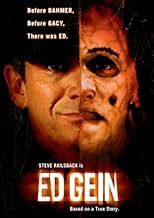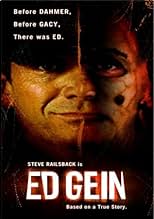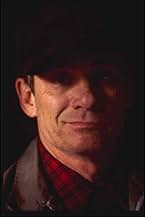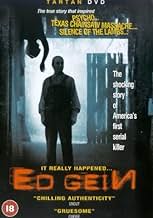VALUTAZIONE IMDb
5,5/10
5710
LA TUA VALUTAZIONE
Orribile storia vera dello psicopatico Ed Gein, la cui inclinazione all'assassinio e alla mutilazione hanno ispirato alcuni leggendari film sui serial killer.Orribile storia vera dello psicopatico Ed Gein, la cui inclinazione all'assassinio e alla mutilazione hanno ispirato alcuni leggendari film sui serial killer.Orribile storia vera dello psicopatico Ed Gein, la cui inclinazione all'assassinio e alla mutilazione hanno ispirato alcuni leggendari film sui serial killer.
- Premi
- 4 vittorie e 2 candidature totali
Thomas C. Rainone
- Butch
- (as Tom Rainone)
Trama
Lo sapevi?
- QuizThe scene with Steve Railsback dancing in the moonlight while wearing a woman's skin was done in a single take.
- BlooperA mountain range is seen looming over Plainfield, Wisconsin, which as its name suggests, is on a plain.
- ConnessioniFeatured in IFC Grindhouse: Ed Gein (2007)
- Colonne sonoreSelfish Heart
Written and performed by Ed Maxwell and Joel Sigerson
Recensione in evidenza
Considered as a film about an unhappy and perverted man, the movie is so-so, perhaps a bit more. A boy and his brother grow up on a dismal farm. Their father is brutal, their mother religious and caring but stern too. Always, when they show weakness, there is the shadow of the allegation of femininity hanging in the background. Older boy leaves home as soon as decorum allows.
The father disappears from their lives and the mother, domineering and clinging, takes over Ed Gein's life. She dies painfully. Ed goes mad. Mother appears in hallucinations, telling Ed what to do, scolding him if he hesitates, prompting him to acts most of us might vomit at the mere thought of.
But you know what? This is way, way ahead of the usual sorts of slasher movies, the kind that have turned into self parodies. Railsback was executive producer and cast himself in the principal role, and he's good too, although his mangled Southern mumble is a bit difficult to square with the actual Wisconsin setting of the events. Railsback underplays Gein's psychosis just enough. Gein isn't a loony loner, as he might have been. He's a slow-moving gloomy looking guy who dresses like a sloppy rube (you can almost smell his unwashed overalls) but he's reasonable in public, seems to have his wits about him. He makes the right kinds of comments, more or less, at the times they are called for. Overhearing a conversation between a saleswoman and a customer who has heart disease, he wishes her well on her forthcoming operation, a nice gesture that anyone with claims to normality might make. Railsback makes him quiet, slightly awkward, and gives him a constant shy smile in front of others. It's a fine portrayal of schizophrenia, better than Russel Crowe's in "A Beautiful Mind." Gein is just about perfect, a shambling walk (almost on tip toe), a stare that lasts far too long, the unfunny joke he tells that makes him laugh out loud while others gawk, the half-baked religious ideas, a daily cycle that seems all non sequitur. He gets the necessary chores done, buys antifreeze and goes shopping. Not the way you and I might -- he lives on nothing but canned pork and beans (and some other things) -- but he gets the job done. He hangs out from time to time in a depressingly dark rural saloon, where he sits one or two stools away from the few other customers. The others know him, and some, like the bartender, are kind and sympathetic to him, while some make jokes about him. That's his public face. Rather a dull lonely man, a sad man really who has never recovered from his mother's death, someone who needs looking after and will never get it.
His home, however -- well, that's a different matter entirely. As a police officer once said about Son of Sam's residence, "the inside of his house looks like the inside of his head." It's a remote and non-productive place, falling apart on the outside, the lock missing from the front door, old tires and bedsprings in the yard. That's just the outside. The inside is even worse. Horrible, in fact. About the single most depressing dump I can remember seeing on screen in recent years. Little light seems to enter. And what the light shows us we'd rather not see. The man seems never to have thrown out any piece of junk he's come into possession of. Old newspapers stacked in corners. Dirty dishes. An unmade bed that any prison could improve upon.
Gein was frankly nuts, no question about it. But, as I understand it, he murdered only two people, both of them middle-aged ladies who treated him in a motherly fashion. Of course the house had body parts all over it but these were from dug-up corpses. The man ate out of bowls made from that part of the skull called the calvarium, and so did his few guests. But naturally he had few guests. He made a few dollars babysitting two boys at his place but when one of them wandered into his bedroom -- the bedroom with the shrunken heads on the walls and the rats on the floor -- he ushered the kids to the door and politely and firmly told them not to come back. "I guess a man needs his privacy," he tells them.
The two murders are horrifying in a non-sensational way. Both women are shot without expecting it to happen. One doesn't die immediately and protests when her punctured body is dragged out to Gein's truck to be taken to his cellar and dressed like a hog. But, although the scenes are graphic and realistic, they are not at all sensationalized. No preliminary threats, no bondage or torture, no screaming, no maniacal whacking with axes or bashing in of heads with maces. It's all the more frightening for its matter-of-fact tone. And there is one scene in which Gein, a raving lunatic, dances out of his front door into the moonlight, dressed in long johns and human skin, a merkin fixed to his groin, banging pots and pans and whooping with God only knows what rotten pot of exaltations. It's far more shocking than anything in "Henry: Portrait of a Serial Killer," although the two have the senselessness of random murders in common.
You want to be scared? This true story, this production, ought to do the job. You'll be locking your doors at night.
The father disappears from their lives and the mother, domineering and clinging, takes over Ed Gein's life. She dies painfully. Ed goes mad. Mother appears in hallucinations, telling Ed what to do, scolding him if he hesitates, prompting him to acts most of us might vomit at the mere thought of.
But you know what? This is way, way ahead of the usual sorts of slasher movies, the kind that have turned into self parodies. Railsback was executive producer and cast himself in the principal role, and he's good too, although his mangled Southern mumble is a bit difficult to square with the actual Wisconsin setting of the events. Railsback underplays Gein's psychosis just enough. Gein isn't a loony loner, as he might have been. He's a slow-moving gloomy looking guy who dresses like a sloppy rube (you can almost smell his unwashed overalls) but he's reasonable in public, seems to have his wits about him. He makes the right kinds of comments, more or less, at the times they are called for. Overhearing a conversation between a saleswoman and a customer who has heart disease, he wishes her well on her forthcoming operation, a nice gesture that anyone with claims to normality might make. Railsback makes him quiet, slightly awkward, and gives him a constant shy smile in front of others. It's a fine portrayal of schizophrenia, better than Russel Crowe's in "A Beautiful Mind." Gein is just about perfect, a shambling walk (almost on tip toe), a stare that lasts far too long, the unfunny joke he tells that makes him laugh out loud while others gawk, the half-baked religious ideas, a daily cycle that seems all non sequitur. He gets the necessary chores done, buys antifreeze and goes shopping. Not the way you and I might -- he lives on nothing but canned pork and beans (and some other things) -- but he gets the job done. He hangs out from time to time in a depressingly dark rural saloon, where he sits one or two stools away from the few other customers. The others know him, and some, like the bartender, are kind and sympathetic to him, while some make jokes about him. That's his public face. Rather a dull lonely man, a sad man really who has never recovered from his mother's death, someone who needs looking after and will never get it.
His home, however -- well, that's a different matter entirely. As a police officer once said about Son of Sam's residence, "the inside of his house looks like the inside of his head." It's a remote and non-productive place, falling apart on the outside, the lock missing from the front door, old tires and bedsprings in the yard. That's just the outside. The inside is even worse. Horrible, in fact. About the single most depressing dump I can remember seeing on screen in recent years. Little light seems to enter. And what the light shows us we'd rather not see. The man seems never to have thrown out any piece of junk he's come into possession of. Old newspapers stacked in corners. Dirty dishes. An unmade bed that any prison could improve upon.
Gein was frankly nuts, no question about it. But, as I understand it, he murdered only two people, both of them middle-aged ladies who treated him in a motherly fashion. Of course the house had body parts all over it but these were from dug-up corpses. The man ate out of bowls made from that part of the skull called the calvarium, and so did his few guests. But naturally he had few guests. He made a few dollars babysitting two boys at his place but when one of them wandered into his bedroom -- the bedroom with the shrunken heads on the walls and the rats on the floor -- he ushered the kids to the door and politely and firmly told them not to come back. "I guess a man needs his privacy," he tells them.
The two murders are horrifying in a non-sensational way. Both women are shot without expecting it to happen. One doesn't die immediately and protests when her punctured body is dragged out to Gein's truck to be taken to his cellar and dressed like a hog. But, although the scenes are graphic and realistic, they are not at all sensationalized. No preliminary threats, no bondage or torture, no screaming, no maniacal whacking with axes or bashing in of heads with maces. It's all the more frightening for its matter-of-fact tone. And there is one scene in which Gein, a raving lunatic, dances out of his front door into the moonlight, dressed in long johns and human skin, a merkin fixed to his groin, banging pots and pans and whooping with God only knows what rotten pot of exaltations. It's far more shocking than anything in "Henry: Portrait of a Serial Killer," although the two have the senselessness of random murders in common.
You want to be scared? This true story, this production, ought to do the job. You'll be locking your doors at night.
- rmax304823
- 9 apr 2003
- Permalink
I più visti
Accedi per valutare e creare un elenco di titoli salvati per ottenere consigli personalizzati
- How long is Ed Gein?Powered by Alexa
Dettagli
- Data di uscita
- Paesi di origine
- Lingua
- Celebre anche come
- Ed Gein
- Luoghi delle riprese
- Aziende produttrici
- Vedi altri crediti dell’azienda su IMDbPro
Botteghino
- Lordo Stati Uniti e Canada
- 5.708 USD
- Fine settimana di apertura Stati Uniti e Canada
- 5.708 USD
- 6 mag 2001
- Tempo di esecuzione1 ora 29 minuti
- Colore
- Mix di suoni
- Proporzioni
- 1.85 : 1
Contribuisci a questa pagina
Suggerisci una modifica o aggiungi i contenuti mancanti

Divario superiore
By what name was Ed Gein - Il macellaio di Plainfield (2000) officially released in India in English?
Rispondi



















